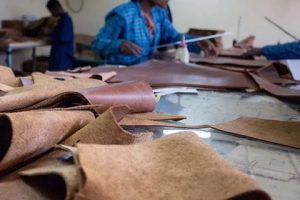
Ethiopia has high potential in the manufacturing industry. However, the sector’s many problems, both in terms of type and quantity, have prevented the country from getting the benefits it deserves. In addition, the problems have been obstacles to the success of the structural transition of the economy, which has been talked about for many years. It has been repeatedly stated that the sector is constrained by problems of space, power, finance and foreign exchange among others.
Lack of foreign currency in the sector and inequitable use, lack of proper attention to local investors, and weak work culture are raised as bottlenecks. Besides, improper implementation of policies and guidelines to encourage the sector is one of the main problems investors faced.
According to Ministry of Industry, industries are producing below their capacity due to the reasons mentioned above. Currently, the manufacturing industry sector has a share of no more than seven percent of the total national product, and it is planned to increase this share to 17.2 percent in the next 10 years. In addition, there is a plan to increase the productivity of the current 50 percent of industries to 85 percent.
Among the solutions set by government is the “Ethiopia Tamirt” national movement announced in April 2022. The main objectives of the national movement are to jointly solve the problems of the manufacturing industry by creating favorable conditions for sustainable development and competitiveness, enabling the sector to contribute to the economic structural transition. They are also improving the work culture in the sector, improving the quality and competitiveness of industrial products and enhancing the ability to substitute imported products.
The movement is believed to be a crucial step in Ethiopia’s efforts to sell competitive industrial products in the international market, to replace imported industrial inputs with domestic ones and to overcome the shortage of foreign currency. The pillars are engaging stakeholders, supporting the sector through research, providing sustainable support to the sector and promoting local products and productivity.
Creating more jobs for citizens by creating enabling conditions in the manufacturing industry sector, increasing foreign currency earnings and saving foreign currency costs by substituting import products are the main results expected from the “Ethiopia Tamirt” program.
In the year it was started, more than 50,000 investors and stakeholders in the regions, zones, districts and city administrations participated, and made a great contribution to creating awareness and bringing the investor and the management closer together. This has helped to revive the sector. More than 352 industries that had stopped working have been brought back to work. 635 new industries have started production. Four thousand new investments have been approved to enter the sector.
Regions have implemented the “Ethiopia Tamirt” national movement based on their investment capabilities and other existing conditions. The movement has enabled them to work effectively by solving the problems faced in the industrial sector and they are getting encouraging results from the implementation of the movement. The one-window service and the coordinated operation of institutions have been improving in the regions and the institutions. Support for construction of production centers (sheds) and land supply has been improved.
The move has created a huge potential for manufacturers to produce locally. The movement also helped create better connections not only between manufacturers and buyers, but also between industries. In addition, the producers stated that it is helping them to solve the problems they had in the past and they are getting encouraging results from the implementation.
Information from the Ministry of Industry regarding the performance of the 2022/23 fiscal year indicated that import products worth more than 2.2 billion Dollars were substituted by domestic products. The production capacity of the country’s industries has reached 55 percent. In addition to recording promising results in the implementation of the movement in terms of job creation, product supply and production of proxy products, a better job has been done in supporting the actors of the manufacturing sector to have market and raw material supply links, to improve their understanding and to produce to their full potential.
Biniam Bulcha, the founder and manager of the Yanabi Sheka Nordic Honey Company, said that the “Ethiopia Tamirt” movement has an important role in creating connections between producers. According to him, the relationship between the producers allows for the exchange of resources, production and marketing as well as experiences. This will create a new system and capacity for the sector.
Solomon Tadele, manager of “Onekoo Coffee” in the Oromia Coffee Farmers’ Cooperative Union, explained that the movement has created an opportunity for them to increase production, offer new products, increase production standards and create working relationships with other organizations. Investors in the manufacturing sector should be encouraged to add value to products. For this, manufacturers should be close to the government and discuss on the problems of the sector, and the government should facilitate the procedures that ease the problems of the sector,” he said.
Founder and manager of the “Habte Garment” Private Limited Company, Habtesilassie Gebrekiristos said that the “Ethiopia Tamirt” movement is not a step to be taken lightly. It will play an important role in correcting the stereotypes of the sector. Since the movement started, there have been positive changes in awareness.
Many actors in the sector have been made aware of the movement. In addition, the movement includes measures to increase the productivity of producers. In general, the one-year journey of the movement has shown that directions have been set to alleviate the problems of the manufacturing industry.
The problems of unemployment and cost of living can be solved when the manufacturing industry is supported and the problems solved. For this reason, the “Ethiopia Tamirt’’ movement should be strengthened, Habtesilassie said.
Assistant Professor, Habtamu Girma, an economics teacher at Jigjiga University and a doctoral student at the University of Ibadan, said that although the movement has made a positive contribution in solving the problems of the manufacturing sector, it is necessary to constantly monitor and evaluate the changes that the campaign has brought about, and the problems of the sector require structural solutions rather than short-term ones. He recommended that there is a need to focus on solutions that bring lasting change.
Mola Alemayehu (PhD), a professor of economics at Haramaya University and a senior researcher at “Frontieri” research and consulting firm, explained that the movement is a program that suggests the country should produce based on its potential resources.
“Many countries are trying to get their citizens, investors and foreign investors to produce in their country. Ethiopia’s efforts will not be different. ‘Ethiopia Tamirt’ is related to increasing its national production capacity and strengthening its role of substituting imported products with local products,” he said.
According to him, since lack of resources has forced the country’s industries to produce less than half of their capacity, it is necessary to facilitate the supply of resources to increase production capacity. The move will allow both local investors and foreign investors to engage in investment activities in a better capacity. If supported by appropriate policy framework and concerted efforts, it can be an alternative solution to increase productivity as well as alleviate the shortage of foreign exchange.
For the success of the program, the role of the government, the investor and the people should be clearly identified. The movement needs to be supported by appropriate policies and strategies to achieve better results and to be helpful for sustainable solutions, Dr. Mola suggested.
When the government provides incentives, it must ensure that the incentives are used for their intended purpose. Moreover, the government should monitor and evaluate the implementation of the program and make adjustments, Dr. Mola added.
Regarding the role of the society, he said, “The attitude of giving better attention and interest to foreign products than domestic products should be changed. It is important to realize that whenever we use local products, we are strengthening the capacity of the producers.”
The “Ethiopia Tamirt” movement is believed to be able to reduce the cost of living by enhancing national production capacity, creating more jobs, alleviating the shortage of foreign currency and building a competitive national economy. Actors of the manufacturing sector stressed that it is an alternative solution that should be done.
BY BACHA ZEWDIE
The Ethiopian Herald September 24/2023





